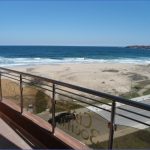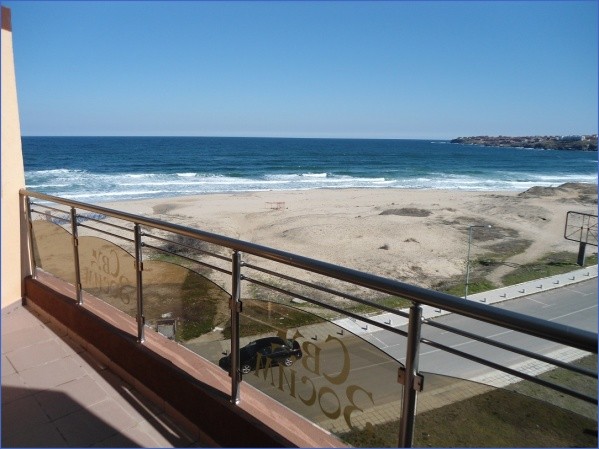There it is! A low hunk of land lists just above sea level like an almost- submerged birthday cake with scattered palm-tree candles. After crossing the equator on our seventh night, Swell slips into the lee of the southernmost island of the Republic of Kiribati archipelago around 8 am. The sea instantly flattens. I celebrate with a badly needed shower, hauling a bucket of sea over the rail and then dousing myself.
I made it! Without anyone’s help! I’m free again and excited for a new start in a new land. The coconut palms wave at me enthusiastically in the breeze. I wave back, euphoric at the tranquility after eight days of constant rolling. As the atoll takes shape, I absorb the earthy smells, new birds, the surface currents and shoreline contours. Details glow when the mind is untainted by familiarity. The atoll’s strip of white beach runs into a rocky, fragmented reef that drops quickly into deep water, allowing me to get close enough to observe the short bunches of shrubs, crabs dashing across the sand, and lime-green seaweed covering the shallows. Wait, what are those odd green-colored clouds floating above the island?
That afternoon, I drop anchor near a large pier, and a salty expat character in his fifties races over from another boat.
“Hey. How you doing? I’m Chuck. Welcome! I know how it is to arrive after a long voyage. I brought you dinner. You’re a surfer? Get some sleep and come by tomorrow. I can fill you in on the place.” He passes me a plate of hot food and smiles as if he has great, wonderful secrets.
“Thank you, Chuck!” I call as he speeds away.
The next day, Chuck gives me the general lay of the land before I head off to find the immigration office. On my way, I run into Chris, a solo sailor from one of the other three boats in the bay. He’s headed to the market on his scooter and offers me a ride, so I gladly climb on the back.
With the first moments of landfall heightening my senses, I can hardly believe I’m on a motorbike whizzing down a one-lane road lined with stunning palms and vibrant village life. Colorful laundry hangs outside scattered palm-thatched homes near piles of coconut husks and kids playing. Whiffs of smoke rising from outdoor kitchens tickle my nostrils. The bright, blue sky blurs with greens and yellows from the overhead palm fronds moving by at twenty-five miles per hour. I can’t contain my smile. A surge of inspiration tingles through me. I must put my personal to-do lists into action, and work to eliminate
12,834 Nautical Miles Traveled Precious Teachers I-Matangs and an Unwanted Surprise Photo Gallery
behaviors that aren’t serving me anymore. Every new arrival is the chance to create myself anew.
The next morning my inner bottom lip is sunburnt and blistered from smiling so much on the motorbike. I can’t smile at all now, but even so, I’m warmly welcomed into the small group of foreigners spending the cyclone season in the low-latitude safety of the equatorial island. We are the I-Matangs, a Kiribati word that means “people from another world.”
There’s Chuck, of course, the sparkling-eyed perma-grom who fled his Southern California Jehovah’s Witness upbringing to chase surf all over the Pacific. He’s spent most of his adult life in the islands of Kiribati, and recently bought a sailboat to start a local charter business.
Chris, the handsome late-forties Canadian UN consultant and single-hander who took me to the market, was diverted north to avoid a tropical storm on a late-season passage from Tahiti to Samoa aboard his boat, Elise. While underway, he collided with something in the night possibly half-submerged debris, or maybe even a whale. Luckily, a flimsy quarter-inch layer of fiberglass remained intact across the four-foot gouge, and he didn’t have to resort to his life raft. He carefully made his way to the closest island, which was here. He’s now got to figure out a way to fix the damage with the island’s highly limited resources.
Melanie and Cedric are a cheerful cruising couple in their early forties aboard Island Breeze, a chubby little steel sloop with rust bleeding from her joints. After determining that time and freedom are the greatest riches, they had given up land life and material possessions to sail away into a life of simplicity. Melanie, a practicing Tibetan Buddhist, was raised in Texas. Cedric is French and is the essence of living in the present.
Henry is a jolly, retired American marine biologist who lives in the village. A former professor at UCSB before my time there he instantly takes a fatherly liking to me. He married a lovely local woman, Teretia, and their heart-melting, four-year-old daughter, Reaua, arrived shortly after as a surprise. Even at seventy years old, Henry’s got endless energy surfing, fishing, playing with Reaua, and running a small local restaurant.
It’s easy not to think about Gaspar as I’m embraced by this wonderfully diverse and friendly group. We’re all moored at an anchorage not far from Henry’s place, behind a large pier the Japanese built in a trade for fishing rights to the incredibly rich surrounding seas. I-Kiribati men gather on the pier to fish, or drink, or fish and drink. A supply ship arrives from the capital city of Tarawa, listing heavily with a constant flow of water pumping from its bilges; the people and the pigs on deck look pleased to be getting off.
I spend my first few days in the bay rushing to get the boat cleaned up for the arrival of another filmer. I’m participating in this women’s surf movie called Dear & Yonder, as part of my ongoing effort to attract sponsors and pay the bills. When I spent a couple of weeks with the directors some months earlier, the waves were uncooperative. So they’re sending Dave to capture more surfing footage.
Dave arrives with not only two huge Pelican cases full of camera gear, but also a new headsail for Swell! My friend Richard from Latitude 38 magazine had put the word out in the sailing community that I was in need of a sail, and Holly, who owns a Cal 40 in Long Beach, had found one sitting in her garage and offered it up for free. My sister picked it up in Los Angeles and delivered it to Dave at the airport before he flew out. If it weren’t for them, I might have had to ask the locals to teach me how they make their sails from rice sacks!
Dave and I launch into two weeks of capturing life aboard Swell, avoiding close-ups of my blistered lip. His hardworking, go-with-the-flow spirit invites good timing and serendipity. We track down a few waves, but he also captures me fishing, diving, fixing the motor, harvesting seaweed, cooking, sailing, climbing coconut trees, playing with dolphins, hanging with local kids, and doing yoga.
A few mornings before Dave’s flight will take him home to Hawai’i, a little yellow speck appears on the horizon. My heart drops. No, it can’t be. After finishing breakfast and discussing the day’s plan, I pop my head out of the cabin just in time to see Octobasse approaching the anchorage.
“Seriously?” I yell to the wind.
“Lissy!” Gaspar calls, once in range. I swim over angrily, and he greets me with, “What happen to your face?”
“What are you doing here? We agreed you would sail somewhere else for cyclone season!?”
“Oye. Then you don’t want el dibujo de (the drawing for) Valentine’s Day I make for you?” he asks sarcastically, waving a paper with colorful hearts.
“Ugggggghhhh!” I groan and swim away.
Buddha on the Bus
I can’t believe it. I just can’t believe it! Why is he here? Gaspar has completely dishonored our agreement and even wants to try our relationship again! Did he hear anything I had said? A rainbow of emotions, running the spectrum from love to hate, resurfaces like a bad case of acid reflux.
When Dave flies home I continue to try to keep my distance, but the Spaniard quickly charms my I-Matang friends, and whether it’s a potluck dinner or a sunset beer, he is in attendance. Since I don’t want to get back together, he finds a way to antagonize me in front of everyone. I begin to isolate myself in order to avoid him, but it’s next to impossible in this tiny, secluded place.
“Hey, Lizzy,” I hear Chuck outside Swell one morning. I pop out on deck. “The north swell is up; let’s go check out some spots on the other side of the bay this afternoon!”
I prep my board and can’t wait to go explore the new breaks with Chuck, until he comes back to pick me up and Gaspar’s in the boat. As soon as I climb aboard, Gaspar says, “What a shame. No chance of catching a fish now that there’s a woman on board.”
I’m instantly irritated, but I wait until we’re in the lineup to get even. He’s a beginner surfer and I snicker as he goes over the falls in his reef booties, then I shred by and spray him on the next wave.
In the days to come I search for something positive in the situation, a way to use some buena manifestacion magic, but I’m at a total loss. I just want him to disappear. I’m rushing to catch a bus to the store, when Gaspar paddles over on his pink kayak. “Lissy, porfavor. Can I borrow your bike?”
I begrudgingly give him the key to my bike, which is locked ashore, and head off by dinghy to catch the bus. I climb aboard, find an empty row near the back, and glare bitterly out the window as Gaspar rides by smiling and carefree on my bike. A minute later, Melanie, my Tibetan Buddhist sailing neighbor, boards the bus and sits down beside me.
“Hi,” I say with a sigh. This whole Gaspar situation is getting the best of me today.
“Are you okay?” Melanie asks.
“Yeah, I’m fine,” I lie.
“Well if you’d like to talk about something, I’m happy to listen,” she says sweetly.
She’s a radiant woman with bold red hair, high full cheekbones, and smiling eyes behind thick-rimmed glasses. Although I don’t know her very well, she makes me feel safe. But I don’t need to bore her with my dramatic love saga.
We both quietly survey the chaos in the bus. Islanders of all ages pile on, and when no seats remain, the aisle fills with standing passengers. Mothers pass their babies to someone with a seat as the bus begins to roll. At the main road, the bus goes right instead of left, away from the store. With the language barrier and mob of passengers, there’s nothing to do but go along for the ride. We head into the next town and pick up some elderly women at the health center, then drop them off again a few miles farther down the road. After making a U-turn, we then stop to pick up some coolers from a short, animated man. Finally, we start off in the right direction, but soon turn off for another detour down a rutted dirt road. Ten minutes of bouncing later, we load up a family of seven and their two pigs. Arriving at the store seems less and less probable.
Meanwhile, my insides are eating me up. When the bus takes yet another detour, I gush my story to Melanie. She listens intently without interrupting, and after I’ve spilled everything, she takes a deep breath.
“That’s hard,” she says sincerely. And she shares a simple message: “You know, my guru explains that we must turn our poison into medicine. Buddhists believe that difficult people and situations in our lives are our most precious teachers. They give us the greatest opportunities to practice our virtues.”
“Really?” I reply with tears in my eyes.
“Yes, by doing this, we can turn our adversities into opportunities to grow. It is the work of a lifetime, but applying this teaching always helps change my perspective.”
Her words are a beam of light piercing the darkness in my mind. The negative cloud begins to lift as I finally see a positive use for my irritating and inescapable situation.
Melanie shares more about her own journey, expanding on these principles. Between her humble presence and the intriguing information, I don’t mind that the bus is stopped again, waiting for more passengers.
I thank her as we finally pull up at the store more than an hour later. I step off the bus feeling like a different person. I have a new mission.
Gaspar has finished his shopping and he greets me with an ice cream in his hand. “What takes you so long?” he asks while licking his melting bar. ” iQue d^a hermoso para pasear en bicicleta!” (What a beautiful day for a bike ride!)
His arrogant glee would have irritated me earlier that morning, but now I am armed with my new secret weapon.
Practice my virtues. Practice my virtues. I repeat in my head. “Si, what a beautiful day!”
He looks at me sideways, scrunching his brow, expecting a frown or a harsh reply. I walk past him, smiling, in my invisible new armor. Either I am going to be miserable for all of cyclone season, wishing he would go away, or accept my unwanted reality and step up to the bat.
I can’t believe how quickly the situation turns around. I feel renewed and empowered. I challenge myself to remain calm in the face of what previously provoked anger or sadness. Now that I have a way to use the situation as a personal challenge, I turn it into a game.
I spend more time with Melanie. She teaches me some meditation techniques and gives me a poster that interprets a well-known Buddhist text Eight Verses for Training the Mind to hang in my cabin. Among the verses are avowals to never think of oneself as better than others; avoid all negative emotions; offer victory to jealous people when they treat you badly; cherish difficult people as precious treasure; and avoid worldly concerns like gain-loss, pleasure-pain, praise-blame, fame-dishonor.
So, difficult people and situations are actually the path to personal growth. This notion makes the elusive goal within reach. If challenges are the tool for liberation, then all I have to do is use the experiences that life provides to keep refining myself and becoming more like that enlightened person on my list of WHO I WANT TO BE. This makes sense!
Maybe You Like Them Too
- Top 10 Islands You Can Buy
- Top 10 Underrated Asian Cities 2023
- Top 10 Reasons Upsizing Will Be a Huge Travel Trend
- Top 10 Scuba Diving Destinations
- World’s 10 Best Places To Visit






